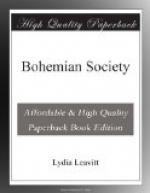I am often struck with the idea that the religion which is taught from our pulpits frequently helps to nourish all that is most selfish in our natures. We are taught that for every kind act we perform, we may expect a reward hereafter. In worldly matters we would have a poor opinion of a friend—or one calling herself such—who for every small act of kindness shown us, was constantly thinking of the benefit she was to derive from it. Why will the reasoning not apply to spiritual matters? Such teaching develops all that is lowest in human nature. And again we are told that by doing certain things which are sinful in the sight of God, we may expect punishment hereafter; consequently many people are deterred from wrong doing, simply from fear; not because of any inner consciousness of wrong doing, but for fear of the consequences of their sin. Would it not be well to teach and train the human mind to the belief that any act committed which is injurious to ourselves or our fellow creatures is wrong, because the act in itself is wrong and not because we are to be punished in the future.
Imagine a prisoner, a dangerous character, who conducts himself properly while under the eye of the keeper and in sight of the lash, compelled by fear to conform to rules, does the work appointed him, not from a consciousness of doing right, not because the doing right is a pleasure, but through fear of the consequences if he disobeys. He serves his time, is discharged, but what kind of a citizen does he become? If fear only restrains him from wrong-doing what object will he have in doing right? Leave out the doctrine of reward and punishment, teach and train the mind to something higher and holier than mere personal gratification. The religion of humanity is a grand, a noble belief. To remember that each and every one has some claim to consideration, that the way to restrain from wrong-doing is through the human heart. A warm hand clasp and a sympathetic tear will do more to strengthen ones belief in heaven than all the tracts which were ever written. Can we believe in the goodness and loving kindness of God, when we see nothing but coldness and selfishness in our fellow creatures. Ah believe me, the chords of the human heart are very tender and if touched by a sympathetic hand will produce sweet sounds but if touched by the unfriendly hand of coldness and indifference, the sounds will be harsh and discordant. There is no one so low, so ignorant, so fallen, but has claims upon our sympathies. The Turks collect every scrap of paper that comes in their way, because the name of God may be written upon it. Deal tenderly with every fellow creature, for all are made in the image of God. A few kind words have saved many lives from shipwreck. Phariseeism says to itself after hearing of the sin of some poor mortal “I am holier than that person. I have never sinned in that way,” forgetful of the fact that they have never been tempted in the same way. The religion of humanity says “here




